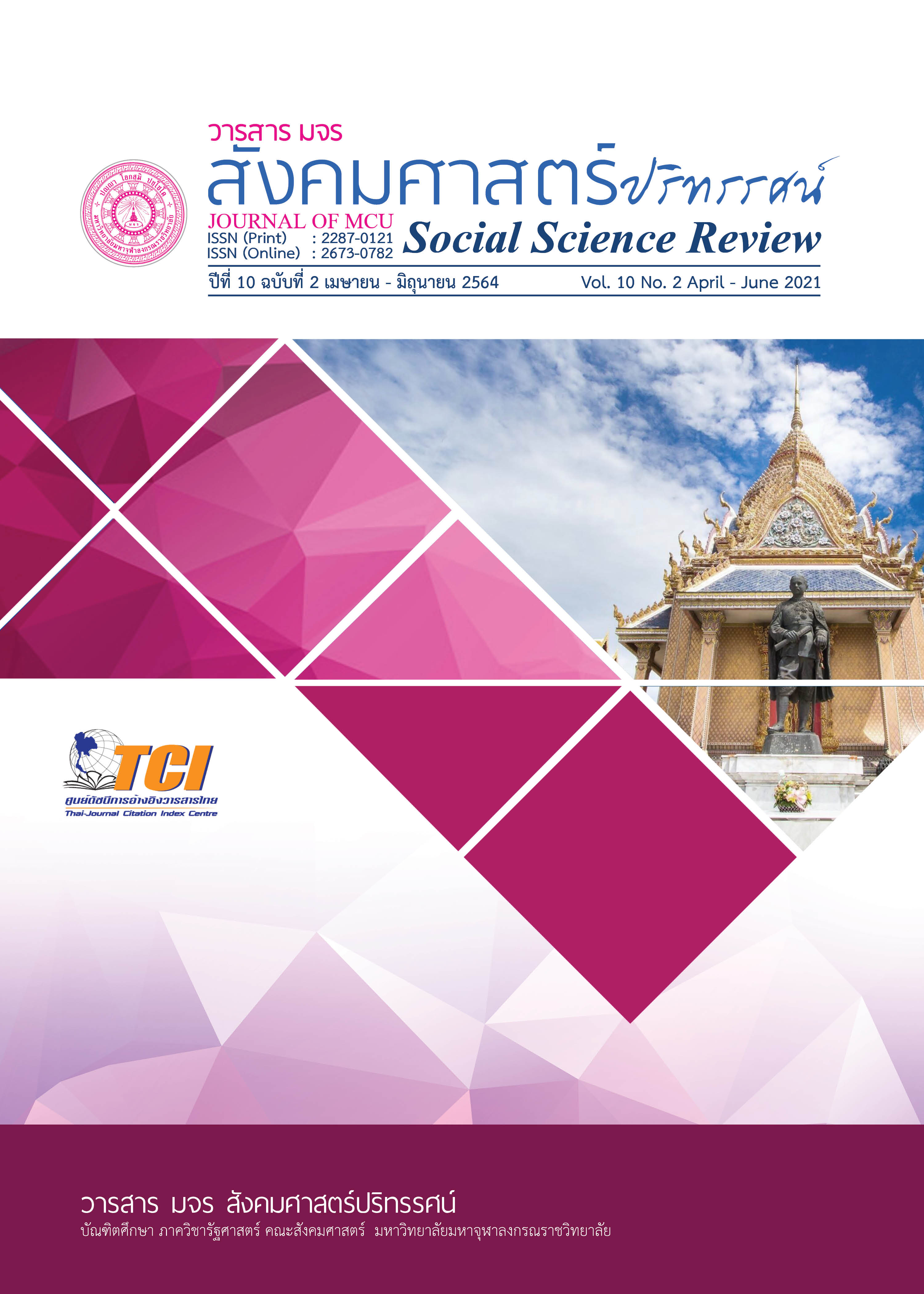การวิเคราะห์สมรรถนะทางคณิตศาสตร์ของนักเรียน
คำสำคัญ:
การประเมินสมรรถนะ, สมรรถนะทางคณิตศาสตร์, ข้อสอบวัดสมรรถนะทางคณิตศาสตร์บทคัดย่อ
การวิจัยนี้มีวัตถุประสงค์เพื่อวิเคราะห์สมรรถนะทางคณิตศาสตร์ของนักเรียน ด้วยข้อสอบวัดสมรรถนะทางคณิตศาสตร์ ระดับที่ 6 จำนวน 30 ข้อ ระเบียบวิธีวิจัยเป็นแบบหลายช่วง (Multi-phase Design) โดยแบ่งการวิจัยออกเป็น 2 ระยะ คือ ระยะที่ 1 ใช้การวิจัยเชิงปริมาณและเชิงคุณภาพโดยให้นักเรียนทำข้อสอบ จากนั้นนำผลการทดสอบมาทำวิเคราะห์เชิงลึก (In-depth Analysis) เพื่อหาสมรรถนะ ระยะที่ 2 เป็นการวิจัยเชิงคุณภาพ โดยวิเคราะห์คำตอบเพื่อชี้ประเด็นในการพัฒนาการจัดการเรียนการสอน เครื่องมือในการโดยใช้ข้อสอบที่สามารถวัดสมรรถนะทางคณิตศาสตร์ได้ กลุ่มเป้าหมายคือนักเรียนอายุระหว่าง 12-15 ปี จำนวน 139 คน โดยเครื่องมือในการวิเคราะห์ข้อมูล ประกอบด้วย การวิเคราะห์จากกระดาษคำตอบ การวิเคราะห์คำตอบรายข้อ (Item Analysis)
ผลการวิจัยพบว่า กลุ่มเป้าหมายร้อยละ 58.51 มีสมรรถนะด้านที่ 1 สมรรถนะที่มีความสัมพันธ์กับความรู้ โดยสามารถนำความรู้และทักษะทางคณิตศาสตร์ที่จำเป็นที่เกิดขึ้นจากการจัดการเรียนการสอนในชั้นเรียน ทั้งทักษะการคำนวณ ทักษะการอภิปราย ทักษะการวัด ทักษะการจัดการข้อมูลและสถิติมาใช้ในการแก้ปัญหาในสถานการณ์จริงได้ นอกจากนั้นกลุ่มเป้าหมายร้อยละ 40.63 มีสมรรถนะด้านที่ 2 สมรรถนะที่สัมพันธ์กับการนำไปใช้ โดยสามารถตระหนักและประยุกต์ใช้เครื่องมือและทักษะต่างๆ ทางคณิตศาสตร์มาใช้ในสถานการณ์โจทย์ปัญหาในชีวิตประจำวันได้ โดยสามารถเรียกใช้สมรรถนะในการประยุกต์ความรู้และทักษะในชีวิตประจำวัน และสมรรถนะในการแก้ปัญหาโดยการทำงานนอกจากที่วางแผนไว้และการประเมินผลและการพัฒนากระบวนการและผลลัพธ์ในการแก้สถานการณ์โจทย์ปัญหาในชีวิตประจำวันได้
เอกสารอ้างอิง
ไมตรี อินทร์ประสิทธิ์. (2546). การปฏิรูปกระบวนการเรียนรู้วิชาคณิตศาสตร์ในโรงเรียนโดย เน้น กระบวนการทางคณิตศาสตร์. ขอนแก่น: ขอนแก่นการพิมพ์.
______. (2557). กระบวนการแก้ปัญหาในคณิตศาสตร์ระดับโรงเรียน. ขอนแก่น: เพ็ญปริ้นติ้ง จำกัด.
สถานบันส่งเสริมการสอนวิทยาศาสตร์และเทคโนโลยี. (2009). ผลประเมิน PISA 2009 การอ่าน คณิตศาสตร์และวิทยาศาสตร์ บทสรุปเพื่อการบริหาร. กรุงเทพฯ: สสวท.
Cheah U. H. (2010). Improving Assessment in the Primary Mathematics Classroom Though Lesson Study. Chiang Mai: Proceedings of APEC Chiang Mai International Conference IV: Innovation of Mathematics Teaching and Learning through Lesson Study – Connection between Assessment and Subject Matter; 2010 Nov 2-6; Faculty of Education, Chiang Mai University.
National Research Council. (2001). Adding it up: Helping children learn mathematics. In J. Kilpatrick, J. Swafford, & B. Findell (Eds.), Mathematics learning study committee study. Center for Education. Division of Behavioral and Social Sciences and Education. Washington, DC: National Academy Press.
Niss, M., & Højgaard, T. (Eds.). (2011). Competencies and mathematical learning. Ideas and inspiration for the development of mathematics teaching and learning in Denmark (Tekster fra IMFUFA, no 485). Roskilde: Roskilde University, IMFUFA.
Shimizu, Y. (2011). Building Bridges between Large-Scale External Assessment and Mathematics Classrooms: A Japanese Perspective. In Kaur, B. & Yoong, W. K. (Ed). 2011. Assessment in the Mathematics Classroom Yearbook 2011. Singapore: World Scientific Publisher.co.pte.ltd.
Swan, M., & Burkhardt, H. (2012). A designer speaks: Designing assessment of performance in mathematics. Educational Designer: Journal of the International Society for Design and Development in Education, 2(5), 1–41.
Tachibana, M. (2007). Teaching and Assessment Based on Teaching Guides. In Isoda, M. et.al. (Ed). Japanese Lesson Study in Mathematics - Its Impact, Diversity and Potential for Educational Improvement. Singapore: World Scientific Publishing Co. Pte. Ltd
Webb, L. N. (1992). Assessment of Students' Knowledge of Mathematics: Steps toward a Theory. (pp.663-664). In Douglas A. Grouws (Ed). Handbook of Research on Mathematics Teaching and Learning. Reston, VA: The National Council of Teachers of Mathematics, Inc.
ดาวน์โหลด
เผยแพร่แล้ว
รูปแบบการอ้างอิง
ฉบับ
ประเภทบทความ
สัญญาอนุญาต
ลิขสิทธิ์ (c) 2021 วารสาร มจร สังคมศาสตร์ปริทรรศน์

อนุญาตภายใต้เงื่อนไข Creative Commons Attribution-NonCommercial-NoDerivatives 4.0 International License.
เพื่อให้เป็นไปตามกฎหมายลิขสิทธิ์ ผู้นิพนธ์ทุกท่านต้องลงลายมือชื่อในแบบฟอร์มใบมอบลิขสิทธิ์บทความให้แก่วารสารฯ พร้อมกับบทความต้นฉบับที่ได้แก้ไขครั้งสุดท้าย นอกจากนี้ ผู้นิพนธ์ทุกท่านต้องยืนยันว่าบทความต้นฉบับที่ส่งมาตีพิมพ์นั้น ได้ส่งมาตีพิมพ์เฉพาะในวารสาร มจร สังคมศาสตร์ปริทรรศน์ เพียงแห่งเดียวเท่านั้น หากมีการใช้ภาพหรือตารางหรือเนื้อหาอื่นๆ ของผู้นิพนธ์อื่นที่ปรากฏในสิ่งตีพิมพ์อื่นมาแล้ว ผู้นิพนธ์ต้องขออนุญาตเจ้าของลิขสิทธิ์ก่อน พร้อมทั้งแสดงหนังสือที่ได้รับการยินยอมต่อบรรณาธิการ ก่อนที่บทความจะได้รับการตีพิมพ์ หากไม่เป็นไปตามข้อกำหนดเบื้องต้น ทางวารสารจะถอดบทความของท่านออกโดยไม่มีข้อยกเว้นใดๆ ทั้งสิ้น





